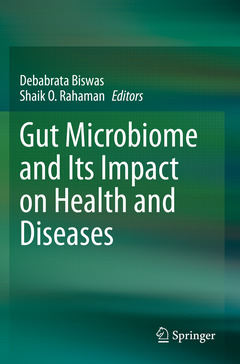Description
Gut Microbiome and Its Impact on Health and Diseases, 1st ed. 2020
Coordinators: Biswas Debabrata, Rahaman Shaik O.
Language: English
Subjects for Gut Microbiome and Its Impact on Health and Diseases:
Publication date: 09-2021
288 p. · 15.5x23.5 cm · Paperback
Publication date: 08-2020
288 p. · 15.5x23.5 cm · Hardback
Description
/li>Contents
/li>Biography
/li>Comment
/li>
This book provides a comprehensive examination of the role of gut microbiome/microflora in nutrition, metabolism, disease prevention and health issues, including farm animal health and food value, and human gastrointestinal health and immunity. Indigenous microbiotas, particularly the gut microflora/microbiome, are an essential component in the modern concept of human and animal health. The diet and lifestyle of the host and environment have direct impact on gut microflora and the patterns of gut microbial colonization associated with health and diseases have been documented.
Contributing authors cover the impact of gut microbiome in farm animal health, and explore the possibility of modulating the human gut microbiome with better animal products to prevent human diseases, including endemic and emerging diseases such as obesity, cancer and cardiac diseases. Dieting plan and control methods are examined, with attention paid to balance dieting with natural food and drink components. In addition, the role of gut microbiota in enteric microbial colonization and infections in farm animals is also discussed.
The volume also explores the possibility of improving human health by modulating the microbiome with better food, including bio-active foods and appropriate forms of intake. Throughout the chapters, authors examine cutting edge research and technology, as well as future directions for better practices regarding emerging issues, such as the safety and production of organic food.
Debabrata Biswas, Ph.D., is an Associate Professor of Bacteriology and Enteric Infections in the Department of Animal Sciences (ANSC) and Center for Food Safety and Security Systems (CFS3) at the University of Maryland, College Park, Maryland, USA. As an enteric infection specialist, he has committed to develop crosscutting research programs in the gut health and immunity area. He serves as editorial board member or reviewer for more than 40 journals and has published more than 75 peer review manuscripts and contributed book chapters for 12 published books. He has also edited several books for world recognized publishers including Elsevier and Springer Nature He has also mentored and trained many graduate students, postdoctoral fellows, and younger scientists and teaches undergraduate and graduate courses related to food safety and gut microbiomes. He has delivered more than 60 invited talks and organized 4 international symposia.
Shaik O. Rahaman, Ph.D., is an Associate Professor in the Department of Nutrition and Food Science at the University of Maryland, College Park, Maryland, USA. His laboratory is interested in elucidating the molecular signaling events underlying the pathogenesis of various inflammatory diseases, specifically, atherosclerosis and fibrosis. Dr. Rahaman earned his Ph.D. in Molecular Biology at Jadavpur University, and an M.S. in Biophysics and Molecular Biology from University of Calcutta. From 2000-2014, Dr. Rahaman worked at Cleveland Clinic, Cleveland, USA, as a Postdoctoral Fellow, eventually as a Project Scientist. He is the recipient of the American Heart Association Scientist Development grant, National Institute of Health (NIH) R01 grant, and National Science Foundation grant. Dr. Rahaman is the author or co-author of 34 research papers in high impact peer-reviewed journals of repute. He has given numerous invited talks nationally and internationally, and is a reviewer/editorial board member in numerousPresents a comprehensive examination of the role of gut microbiome/microflora in nutrition, metabolism, disease prevention and health issues
Explores the possibility of modulating human gut microbiome with better animal products to prevent human disease
Examines cutting-edge research and technology, as well as future directions for better practices regarding emerging issues around natural food and drink components




